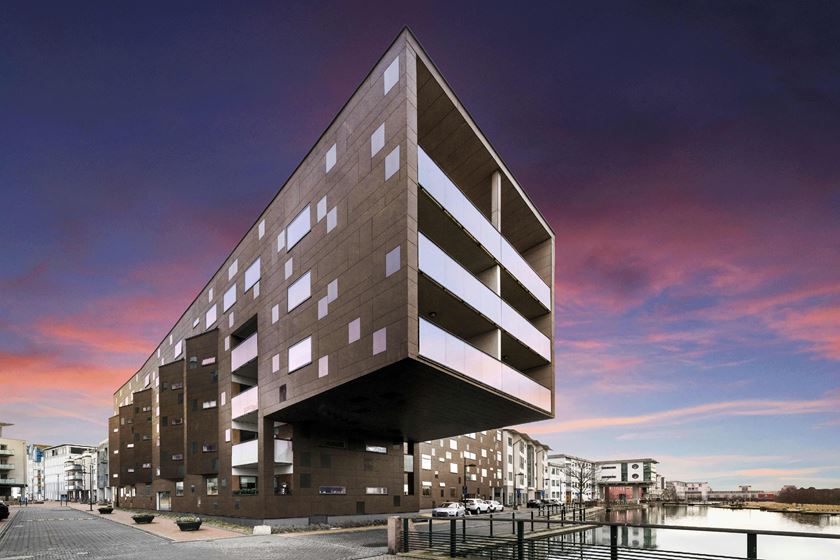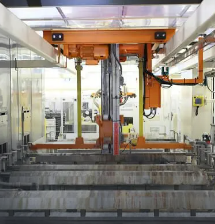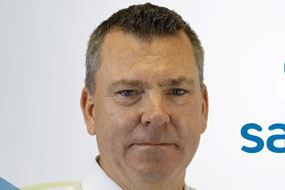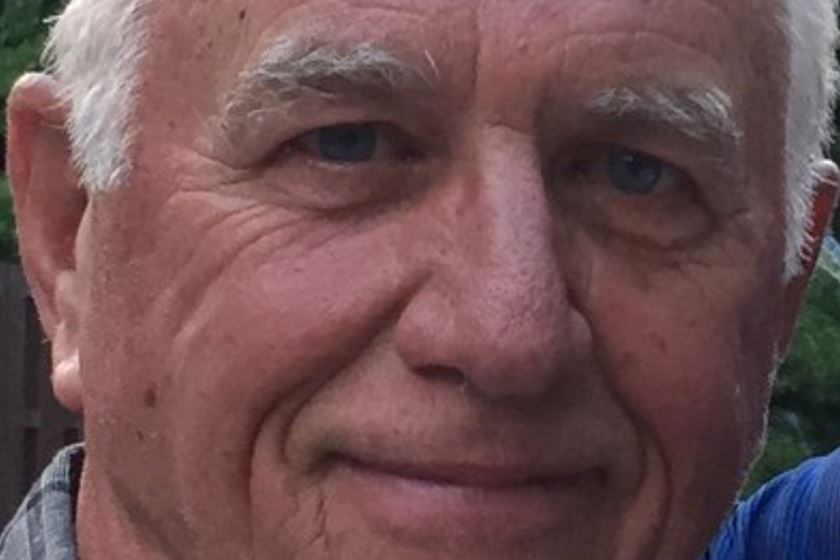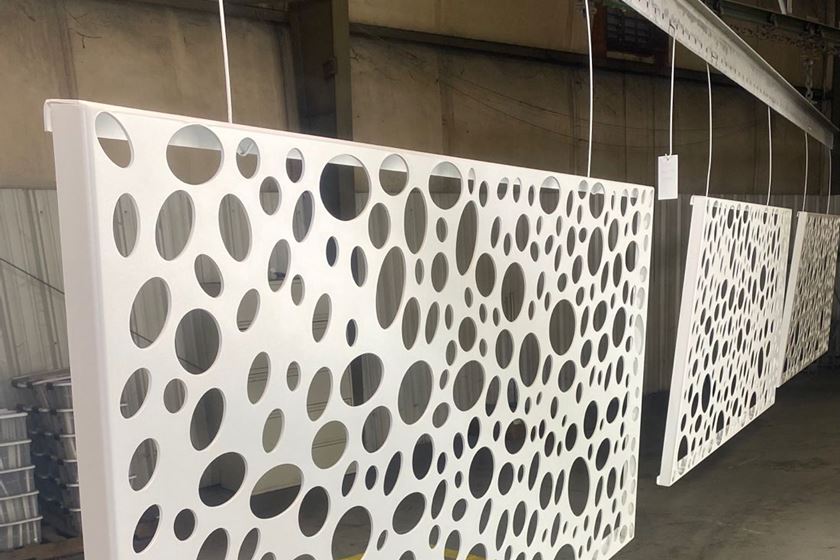iDeal Solution for Florida Powder Coater
Manufacturer relies on vendors’ expertise for new system.
Sometimes the best business plans aren’t created in a paneled corporate meeting room, or even in the hallowed halls of a prestigious Ivy League university.
They often arrive by coincidence, fate or just plain old friendship amongst parents standing around a sandlot watching their kids play tee-ball.
Featured Content
That was the case for Michael Siegel and Doug Brady, who found themselves standing around watching their son’s baseball practice one day and struck up a conversation about a shared dream of one day owning their own business.
Today, that dream is a reality in the form of iDeal Aluminum Products, which designs and manufactures aluminum fences, railing and gates for customers all over the U.S., with a new powder coating system that can handle parts as long as 55 feet.
It was in Atlanta in the summer of 2000 when they started talking about the crazy idea of being entrepreneurs. Of course, careers got in the way. Siegel was a lawyer and a certified public accountant, and Brady worked in building materials, both on the operating and the financial side of the business.
They remained friends over the years—even after Brady moved to Florida—and kept talking about their dream.
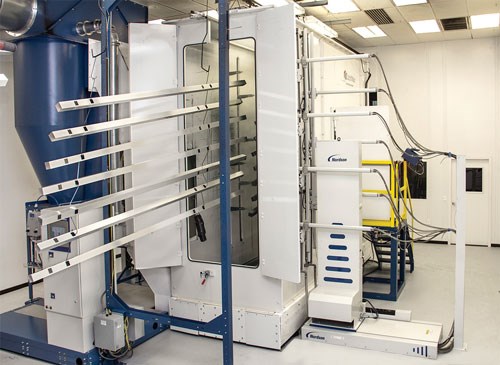
iDeal chose to have Nordson Corp. install its powder coating system.
Becoming Business Owners
“It was a passion each of us had to own a business,” Brady says. “We complement each other very well; what Michael does well I don’t do so well, and the same with my skills. We just matched up well, and we like each other.”
They got serious about their endeavor a few years ago when they decided to seek out companies they could buy and then put their own print on it. In 2010, that life-long dream became a reality when they joined to purchase out of bankruptcy the assets of iDeal Aluminum Products in Deland, Florida.
iDeal was started in 1998, but business suffered during the early part of the new millennium. When the company owners declared bankruptcy and were ordered to sell the business, Siegel and Brady studied the fencing industry and realized they could make iDeal a success with what each brought to the table.
Brady was born, raised and educated in Florida, and he began his career in the building materials industry after finishing college and receiving a master’s degree in business administration and a bachelor of science in accounting from the University of South Florida.
Before he and Siegel purchased iDeal, Brady was the chief financial officer for Baker Distributing, a distributor of HVAC parts and supplies in Jacksonville that had $750 million in revenue.
Siegel was born, raised and educated in Georgia, graduating with law and accounting degrees. He is a member of the State Bar of Georgia, the American Institute of Certified Public Accountants and the Georgia Society of Certified Public Accountants.
Siegel entered the business world after college as an accountant for a large accounting firm, and has also worked for a major investment banking firm.
Turnaround and Move
Brady and Siegel looked at various companies to purchase—including a watch and calculator business—before they zeroed in on iDeal. Brady says they “stalked” the bankruptcy sale and were able to purchase the company and its assets for just $1 over the liquidation price.
“We didn’t want to have an import business, and we didn’t want to be in services,” Brady says. “We wanted something that was asset-based that we could borrow against, and we also wanted to own a company that we could run on our own set of personal set of values. At the end of the day, we felt we could do that with iDeal.”
After the purchase, numerous pressing issues faced the new owners, most importantly that the facility they were in was not well suited for the operations they wanted to run. iDeal was headquartered in a leased 150,000-square-foot facility, which needed some major upgrades, including roof maintenance. They soon started looking around the area for new space, but were fully aware of the effect it would have on their 90 employees in the Deland area.
But the owners had already tripled iDeal’s sales by 2013, and they knew they needed to get into a new facility with new equipment or lose the momentum they had started. Several local counties in Florida region where they were based made them offers to move their plant—and its employees—before Siegel and Brady settled on a location in St. Johns County, nearly 70 miles away from their existing location.
The new facility was 145,000 square feet that iDeal would own and renovate for more than $6.5 million, which included a new powder coating system the owners had decided the new facility had to have to be competitive and manufacture larger fence parts.
iDeal lost a few employees who preferred not to move to travel the extra 70 miles to the new facility, but Siegel and Brady knew it had to be done.
“We couldn’t have stayed in the old place,” Siegel says. “It didn’t make sense, and we needed the new equipment to do what we wanted to do with this business.”
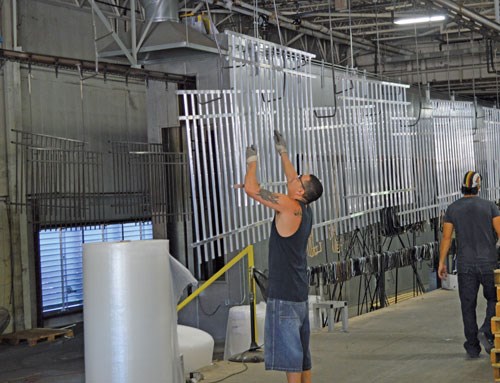
The new 145,000-square-foot facility was a space that iDeal would own and renovate for more than $6.5 million.
Adding New Coating Line
With the move to the new location in the works, Brady and Siegel decided it was time to replace their 10-year-old powder coating system.
“We’ve always produced quality products, but powder coating technology has evolved and improved dramatically over the past decade,” Siegel says. “We knew that we could really benefit from faster color changes, higher powder reclaim rates and more efficient powder application.”
Calling on Brady’s extensive manufacturing know-how and Siegel’s ability to crunch numbers and analyze the data, the pair went back over two years of performance data to determine where they could increase efficiencies with a new line, and what operational improvements could be made.
They first brought together the production team—including the powder supervisor and plant manager—and consulted with their powder supplier, PPG, and their chemical supplier, BCI Surface Technologies (Bulk Chemicals Inc.). The team helped Brady and Siegel understand how they were using their raw materials and what new advancements could be included in the powder coating line.
“From the data we gathered, we really built a straw man of what we wanted with the new system,” Brady says. “It was about an eight-page document that really outlined what we wanted in this new system, and how we wanted to see improvements as a result of the new technology.”
With an advanced sketch of what they wanted their new line to look like, Brady and Siegel then sought out integrators at the Fabtech show in 2013 to see who could best facilitate their operational plan.
Good Prospects at Trade Show
They walked the show with copies of their documents in hand, meeting with spray and booth equipment manufacturers to discuss product lines and features. They also met with several system integrators to see who had the best ideas for taking iDeal’s wish list and building the new system.
“We became very good prospects at the show,” Brady says. “Before we knew it, we were a very hot lead.”
iDeal’s production team narrowed the list of integrators down to three that they wanted to continue talking with, but a few weeks after the show, they came in contact with Pneu-Mech Systems. Suddenly, the Statesville, North Carolina, company went to the top of the line.
“There were a few companies we were looking at, but Pneu-Mech really impressed us with some of their ideas,” Brady says. “It was a tough choice, but the final installation Pneu-Mech gave us could not have gone any better.”
The big challenge for Pneu-Mech was to get such a large powder coating line within an area about 400 feet long by 50 feet wide.
“iDeal had a real solid thought on how they wanted the system to be designed, but we sat down with them and offered a different approach that we thought would work much better for them,” says Jason Gatton, projects manager for Pneu-Mech.

The system included an Encore feed center, an iControl integrated control system and an easy-to-clean Nordson breakaway cyclone.
Line Flexibility
The design that Pneu-Mech offered gave more flexibility for iDeal to run the high-production parts that were 20-foot-long or less, but also be able to handle the 53-foot-long fence sections, all in the same system.
The Pneu-Mech design took up about 40 percent less floor space than what other integrators had presented, something that quickly caught the attention of Siegel and Brady.
“The big issue was the cure oven and turning those big, big parts around, and just how much space all of that was going to take,” Gatton says. “The line is about 400 feet long, but other designs were using 200 feet in width in order to make those turns. We cut it down to just 50 feet wide, and it really is an amazing design.”
Siegel and Brady were very happy to gain some floor space they thought they were going to lose with a new system, especially when they were building some fairly large gates and fence sections that could reach the full 50-plus feet.
“It was a tough call for us, because we liked the other integrators we were working with, but Pneu-Mech’s plan was really good for us,” Brady says. “At the end of the design, build and installation, we knew the system was as good as we could get. They did a great job for us all around.”
Understanding Needs
iDeal also chose to have Nordson Corp. in Amherst, Ohio, install its powder coating system over other equipment manufacturers.
“There was a ton of knowledge transfer about the limitations of our old system, and the capabilities we wanted in a new system,” Siegel says. “There were a number of things we really liked about Nordson. They really understood our needs, and they worked with us to run cost analyses of reclaim efficiencies and color change times as well as multiple scenarios to calculate system payback.
Construction of the new coating line began at the end of 2014, with Pneu-Mech installing a 650-foot oval, monoplane line, which included a clean and pretreatment washer, dry-off oven, environmental room, infrared booster and cure oven.
The new system includes an all-acid, five-stage pretreatment process prior to the parts being sent to the powder coating area. The aluminum parts are processed with an acid-based cleaner, water rinse, conditioning stage and reverse-osmosis water rinse. The parts then receive a phosphoric acid wash followed by a water rinse. The final stage uses an aluminum-specific, environmentally friendly, chrome-free, dried-in-place technology. BCI’s E-CLPS 2100 Series is used with the powder coating to maximize adhesion and corrosion resistance. The parts are then processed through a dry-off oven and ready for the powder coating application.
Nordson put in a ColorMax 2 powder booth and 14, bar-mounted Encore automatic spray guns, plus two Encore manual spray guns for touch up. The system included an Encore feed center, an iControl integrated control system and an easy-to-clean Nordson breakaway cyclone.
The ColorMax booth features a 3 feet × 9 feet opening to accommodate iDeal’s fence, pickets, rails, posts and other large parts that need coating. The system is using PPG’s ARC 2001 flouropolymer and Newlar flouroethylene vinyl ether (FEVE) powder coatings to give the fence, gate and other products significant hardness and impact resistance, in addition to chemical, abrasion and corrosion resistance. iDeal uses standard colors—black, white, bronze and hunter green—but will also provide custom color options into the hundreds.
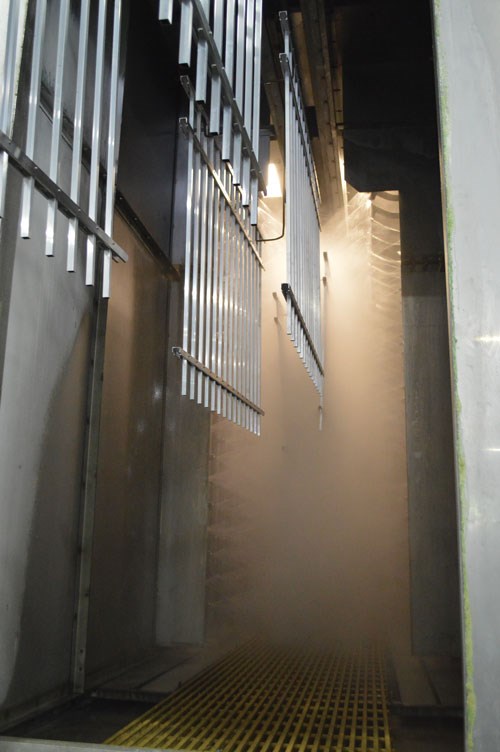
The design that Pneu-Mech offered gave more flexibility for iDeal to run the high-production parts, while also handling the 53-feet long fence sections.
Quick Color Changes
The new line, which moves at about 10 feet per minute, enabled denser loading and packing for improved use and efficiency. The ColorMax 2 spray booth also enables iDeal’s production staff to make color changes in less than 10 minutes, instead of 40 minutes with the old system.
Siegel says iDeal changes colors about eight times per week, so in the past, it took some time to carefully schedule the changes in order not to disrupt the production schedule.
“The fast change capability of our new Nordson system gives us much more flexibility in our production scheduling,” he says. “And it gives us the ability to change colors for shorter runs and custom colors when needed.”
The iDeal production staff reports a more consistent flow of coating to the parts with the Encore spray guns and iControl system. The booth’s sensing technology prevents the guns from spraying when there is a gap between parts, thereby requiring less powder in the booth to get the same mil thickness.
“This is a very robust coating line,” Brady says. “It’s going to do the job for us for the next 15 years if not more.”
Brady and Siegel say that in just the first few months of operation they have realized a significant powder reclaim, as well as a large labor savings with the company now operating one shift rather than two. Meanwhile, they are producing 50 percent more products at a higher quality, as a result of the new system’s increased efficiency, which they estimate could go as many as four times higher than the old one.
“The quality of the finish on our products was always good,” Brady says. “But now, it’s unbelievable.”
Big Challenges Met
The two long-time friends say the last five years have been a challenge as they each have delved into areas they weren’t familiar, including moving their business and installing new equipment, let alone the manufacturing and coating of the fences, rails and components.
iDeal is now profitable growing at good rate, but it wasn’t easy making all the small and big decisions that needed to be made.
“Michael and I are a few pounds heavier and have more grey hair since this all began,” Brady says. “It’s been the hardest thing that either of us have ever done in our careers, but it is the most rewarding thing, too.”
Originally published in the November 2015 issue.
RELATED CONTENT
-
Masking for Surface Finishing
Masking is employed in most any metal finishing operation where only a specifically defined area of the surface of a part must be exposed to a process. Conversely, masking may be employed on a surface where treatment is either not required or must be avoided. This article covers the many aspects of masking for metal finishing, including applications, methods and the various types of masking employed.
-
The Powder Coating Process
Powder coating is one of the most durable finishes that can be applied to industrial manufactured products, and offers excellent corrosion protection and is very safe because of its lack of volatile organic compounds. To understand the powder coating process you should start with the fundamentals.
-
Calculating Oven Heat Load Capacity
Please explain how to calculate the heat load capacity of a paint baking oven, using aluminum alloy wheels as an example.














